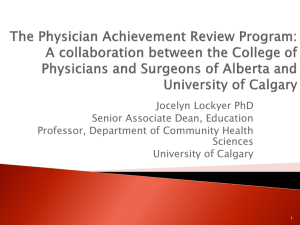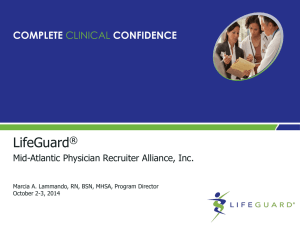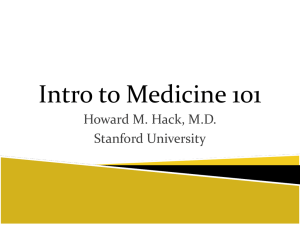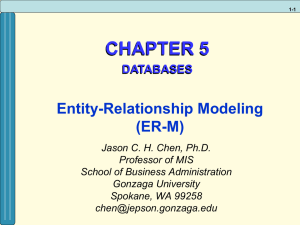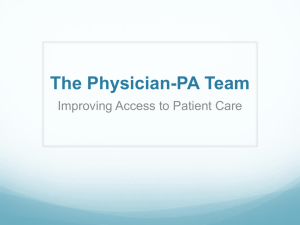Workshop of Choice For Physicians
advertisement
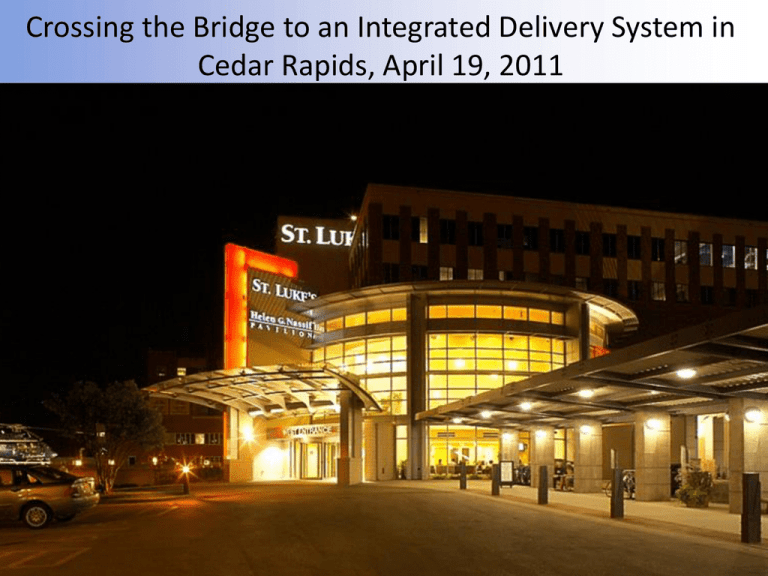
Crossing the Bridge to an Integrated Delivery System in Cedar Rapids, April 19, 2011 The Cedar Rapids Story Strategic/ Economic Relationships Non-Economic Integration Employment, Directorships, Subsidies, Etc. Communication.. …Openness… ..Trust…Respect Visibility/ Accessibility of CEO/Mgmt. Contractual Joint Ventures Equity Joint Ventures Substantive Involvement in Decision Making Multiple strategies For alignment of Economic interests Positive Organizational Culture Infrastructure Improvements to Increase efficiency/ Accessibility of care Information systems Appropriate support For physician Practice growth Emotional Connection Physician Leadership development Financial Integration High quality/ safe Patient care Integrated Delivery Model St. Luke’s Hospital Strategic Framework Demonstrably Better Quality Partner of Choice for Physicians Partnership with Associates Strengthen the Core Regional Resource Workshop of Choice For Physicians • Old Language: 2003 – 2008 “With a focus on clinical quality, efficiency, and service, St. Luke’s will create an environment where physicians prefer to practice and bring their own family members. St. Luke’s will continue to seek ways to achieve strategic and economic alignment with physicians in an effort to create mutually beneficial relationships.” Partner of Choice for Physicians Established in 2008 St. Luke’s will be a trustworthy strategic partner with physicians in the delivery of demonstrably better quality healthcare. St. Luke’s will create an environment where physicians prefer to practice and to bring their own loved ones for care. St. Luke’s will be the first choice of physicians for strategic alignment be it emotional, clinical, or organizational. A Two-Part Framework: • Emotional Connection: – Developing a preferred practice environment provides an underlying structure which demonstrates St. Luke’s is ‘a better place to be’ for patients AND physicians. • Economic and/or Strategic Relationships: – Provide a platform upon which physicians believe that St. Luke’s is a willing and capable partner that can be trusted and relied upon if and when their practice environment is no longer self-sufficient. The Emotional Connection …..Building Trust Desired Outcome: To Build relationships which will foster two way communication between all levels of management and physicians with an emphasis on CEO / C-Suite level contact and development. The Emotional Connection …..Building Trust • Consistent CEO / C-Suite Communication Plan • Establishment of Physician Liaison Support • Annual Physician Satisfaction Survey, Focus Groups, and Pulse Surveys / Rounding. • Specific patient acquisition plans • Communication, Communication, Communication • Images for Physicians • Open Forums 2x per year • Doctor’s Mailbox • Recognition / Events Economic and/or Strategic Relationships … Guiding Principles • The physicians have got to want it: buy-in. • Mutual trust and respect between the parties; openness of communication / transparency of information. • Method of integration is founded on a viable economic model (risk = return). • The approach is consistent with both parties strategic plan and there is a track record of a strong relationship between the organizations. • There is evidence of strong physician leadership in place. • The partnership will enhance and provide accountability for clinical quality, service line growth / advancement, customer experience, and efficiency. Economic and/or Strategic Relationships…Building Partnerships • Hospitalist Program (s) • Surgery Center Cedar Rapids and other Joint Ventures • Peri-Operative Governing Council • Service Line Management • Recruitment Support • W-2 Partnership Partner of Choice for Physician Goals PARTNER OF CHOICE FOR PHYSICIANS 10 Maintain 95th% or above on the top 6 predictors of physician satisfaction – Using results from the 2011 Healthstream Survey, identify and address specific areas for improvement. Maintain performance in 2012 and 2013. 11 Increase year-over-year encounters/contacts at St. Luke’s Physicians and Clinics by 6% in each of the years 2011, 2012, and 2013 (including urgent cares). 12 Maintain 2010 actual inpatient admission market share in the following areas: Inpatient surgical market share (49.7%) Medical/surgical market share (53%) Pediatrics market share (73%) Obstetrics market share (76.9%) Increase market share for each of the inpatient services listed above by 0.5% in both 2012 and 2013. Achieve 2011 Operating Budget targets for all employed physician groups and joint ventures. 13 14 Improve OR Throughput: First case of the day (scheduled start times 0700 and 0730) will start on time as defined by the Perioperative Governing council – Patient and anesthesiologist will be in the room within 5 minutes of the scheduled start time. Targets – 80% by Q4 2011, 85% by Q4 2012, 90% by Q4 2013. All electively scheduled surgical patients will be screened by the STAR department Targets – 100% by Q4 2011, maintain 100% for years 2012 and 2013. St. Luke’s surgery block times will managed by the Perioperative Governing Council to 80% utilization. Targets – Block development in 2011, 80% utilization 2012 and 2013. 15 Achieve Medical Mall ground-breaking by 6/1/2011. Complete construction of SLH Medical Mall space on budget by the end of 2012. 16 Develop the Cedar Rapids Regional Clinic and Integrated Delivery System structure by 12/31/2011. Enter the IHS Strategic Plan … The Vision for the Future IHS will need to reposition itself from a statewide, hospitalcentric delivery system to an integrated care management organization that is physician driven and patient centered, positioned as the primary healthcare utility for the state of Iowa and bordering areas. Integration 101 Definition: A network of organizations that provide or coordinate and arrange for the provision of healthcare services to consumers and are willing to be held clinically and fiscally responsible for the outcomes and the health status of the populations served. Generally consisting of hospitals, physician groups, health plans, home health agencies, hospices, skilled nursing facilities, or other provider entities. The networks may be built through virtual integration processes encompassing contractual arrangements and strategic alliances as well as through direct ownership. Source: MGMA Working Toward An Integrated Delivery System What Integration is NOT • A hospital that employs physicians • A physician practice subordinate to a hospital • Hospital led without physician input or influence The Key to integration is Physician Alignment Physician Alignment – Common Principles IHS’s Physician alignment goals will require some significant changes to accomplish. Category Principles Philosophy Embrace physicians as partners/”owners” not employees. Governance A meaningful physician presence in leadership and governance at all levels within the system. Physician Practice Physicians have authority and accountability for operating all medical practices. Corporate Structure The physician practice entity and hospital entity are organized as separate sister corporations. Infrastructure Best practice physician practices support systems. Clinical Coordination Enhanced care accountability through a common EHR, standard outcomes reporting and a consistent patient experience across group specialties. Compensation There is a single compensation plan that is aligned with the goals of the system. Management Mostly part-time and some full-time physician leaders are paired with administrative leaders in dyad management roles throughout the organization. Managed Care Contracting The system has single-signature managed care contracting authority, and physicians have a substantial representation on the body making contracting decisions. Branding Strong quality and patient advocate brand. Physician-Driven Systems Corporate Structure The physician entity is usually incorporated as a “sister” corporation of the hospital Health System/Hospital (Parent) Physician Entity Hospital A Model For Our Future IHS Corporate Administration and Services Physician Clinic Division Hospital Division Des Moines Clinic Iowa Health – Des Moines Methodist, Lutheran, Blank Cedar Rapids Clinic St. Luke’s Healthcare St. Luke’s Hospital Waterloo Clinic Allen Health Systems, Inc. Allen Memorial Hospital Quad Cities and Muscatine Clinic Trinity Regional Health System Trinity Medical Center and Unity Healthcare Fort Dodge Clinic Trinity Health Systems, Inc. Trinity Regional Medical Center Sioux City Clinic St. Luke’s Health System St. Luke’s Regional Medical Center Dubuque Clinic Finley Tri-States Health Group, Inc. The Finley Hospital Cedar Rapids Physicians Clinic Steering Committee Charter Aim(s): 1. From a Cedar Rapids perspective this committee will serve as the Regional Physician Leadership Council to inform and provide input to the statewide steering committee working on the establishment of NewGroup. Timeline: July 1, 2011 2. Create the ideal integrated healthcare delivery system in the Cedar Rapids region by providing physician leadership and direction to the vision, strategies, and specific initiatives. Timeline: FY 2011. Steering committee will meet 2x/month (2nd and 4th Tuesday). 3. Support the strategic framework of St. Luke’s Healthcare as the region makes the transition to an integrated delivery system. Timeline: FY 2011 and ongoing. Team System Sponsor: Alan Kaplan, M.D. Chair: Ted Townsend Members: Ken Anderson, M.D., John Roof, M.D., Todd Langager, M.D., Dustin Arnold, D.O., Dennis Rosenblum, M.D., Judy Bernhard, M.D., Shannon Throndson, M.D., Charles Schauberger, M.D., Robin McNichols, John Sheehan, Support Staff: Leigh Christensen Physician Leadership Academy—Cedar Rapids Dr. Dustin Arnold Dr. John Roof Dr. Shannon Throndson Hospitalist Med. Dir. & CMIO IHP Med. Dir-Central Reg. Family Practice Physician Dr. Todd Langager Dr. Dennis Rosenblum Dr. Julie Bernhard Med. Dir. for Cardiology Med. Dir. Neonatology Pediatrician Integration Hierarchy Shared Leadership Shared Leadership defined as physician led, professionally managed. Alignment & Mutual Dependency Resource Sharing Source: Integrated Delivery Systems / AMGA Organizational Structure Organizational Composition Critical Success Factors for Integration • Structure • Aligned Strategic Planning, Goals, and Initiatives • Aligned Physician Compensation Plan • Culture of the Organization • Continuum of Services / Coordination of Care • Physician Leadership Cedar Rapids Physicians Clinic Agenda • Complete committee education regarding St. Luke’s market position, competitor overview, strategic plan, and master facility plan. • Complete committee education regarding other integrated delivery systems – focusing on those that are most relevant to the Cedar Rapids region. Areas of interest include governance, compensation structure, and start-up struggles/successes. • Develop a better understanding of the current initiatives and future direction of PCI. • Develop Regional Clinic and Integrated Delivery System structure. • Establish and engage regional IHS Physicians Clinic Steering Committee. • Assess and recommend human resource support for partner physicians. • Identify and formalize the physician/administrator dyad for major service lines. • Identify future priorities for expansion of partner physicians. • Identify next round of leaders in the IHS Physician Leadership Academy. • Develop regional outreach strategies/hubs. • Establish a revenue capture measurement tool for the Integrated Delivery System’s closed economy. Develop internal approach and philosophy related to a closed economy. Jump Start to Integration • Identify integration champions. • Set a clear vision for integration, tie it to the mission. • Assure patient care is top priority. • Let the physician leaders be the voice. • Demonstrate a culture of teamwork, inclusion and transparency. • Develop a specific plan. How does Integration Benefit Patients? Not for the Faint of heart …. must have ice water in your veins. “Embarking on the path of creating an integrated healthcare organization from a matrix of private practice is a little like driving a truck loaded with nitroglycerin along a bumpy bridge. Leaders without the political skills to sense the bumps before they hit them will never know what happened.” Jeff Goldsmith, PhD Healthcare Futurist The Cedar Rapids Story Strategic/ Economic Relationships Non-Economic Integration Employment, Directorships, Subsidies, Etc. Communication.. …Openness… ..Trust…Respect Visibility/ Accessibility of CEO/Mgmt. Contractual Joint Ventures Equity Joint Ventures Substantive Involvement in Decision Making Multiple strategies For alignment of Economic interests Positive Organizational Culture Infrastructure Improvements to Increase efficiency/ Accessibility of care Information systems Appropriate support For physician Practice growth Emotional Connection Physician Leadership development Financial Integration High quality/ safe Patient care Integrated Delivery Model Next Steps • Answer the big questions: – Do we believe this plan? – How would it work in our market? – What can I do to help achieve it?

